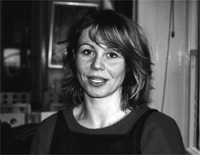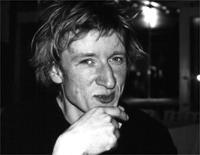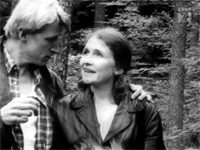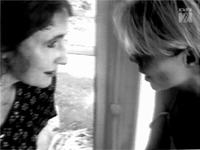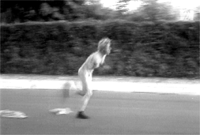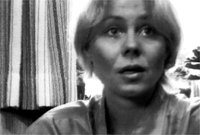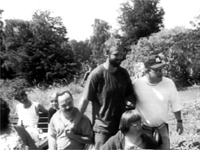How did Lars von Trier first present the project to you? LH: He invited us to his home and told us how the idea came to him, that it was an old idea he had been carrying around for a long time, the idea of being an idiot, that is. Then we simply sat around and talked and then he went to Sweden and wrote the script in five days. JA: The fact is that the Dogma rules and this particular work of fiction are closely intertwined so therefore itís true what Louise says, that he had been storing the idea for an idiot film for quite some time. Lars has always made rules for his films. These have always been rules for himself, so this time he thought it could be fun to write down these rules and ask others to make films under the same conditions. The Idiots was a piece of fiction that fit the rules but itís equally true to say that the Dogma-rules fit this piece of fiction; fiction and rules come into existence simultaneously in all Larsí films. Form and content are two sides of the same coin. However, when we received a piece of paper containing the Dogma rules, they didnít mean much to me. We had read about Dogma 95 in the newspapers and I remember thinking to myself: "What the hell is this?!" Even the casting was very much in the spirit of the whole project Ė 22 people taking part in one huge collective improvisation. It was a complete mess! LH: It was really awful! JA: And I was completely sure Iíd never hear anything from them again. -Were you cast specifically for the parts you have in the film? LH and JA: You bet we were! JA: When the project was presented to me, the last scene in the home of Karenís family was essential to the film. It was as though everything else was to build up to that particular scene. This scene was written in advance, prior to the casting, and it looks very much like the scene in the film. I had the impression that this was the scene Lars was very sure of. He knew exactly that he wanted it to be done in this particular way. The shooting of that scene seemed longer than all the others. -Itís quite paradoxical that the last scene was predetermined when you hold it up against all the improvisation that took place. JA: Yes, but to me the film falls in two parts. Thereís that first part of the film which I know was written on the basis of many discussions. I went up to Lars and we climbed trees, we talked about tumors etc. and then we wrote this and that into the script. Therefore, the execution of that part of the film was very different from the execution of the final scene. Well, I didnít take part in the final scene but isnít it true that Lars was very firm and precise about what he wanted and didnít stop until he had captured that? LH: Yes, absolutely. It was also my understanding that he knew exactly what he was looking for. JA: And I think itís wise not to lose grip of the key points of a story, and itís also wise to balance tight and loose direction. -Louise, when shooting the last scene did you notice a change in genre? The first part of the film may be said to be dominated by comical elements whereas the last shifts to tragedy. LH: Well yes, maybe not a change of genre but there definitely was a shift. For one thing there was no improvisation. Furthermore, three days had been set aside just for the shooting of that last scene. Altogether, there was a more serious atmosphere because it was the climax of the film Ė the essence of what the film was about. So it was very, very important that every detail was just right. -The film was also shot chronologically. JA: Now that I felt was a great help to the actors. I mean, I almost couldnít imagine it being done in any other way, the whole process wouldíve been... LH:...also because everything falls apart gradually in the group. I canít imagine the film being shot in a non-chronological way. -Could you give a brief description of a typical shoot? JA: Typical would be "today we shoot scene 9". We meet, make some agreements and do some tests... very conventional... and then we do scene 9 almost the way it is written in the script. We would often modify the lines. Then we would shoot the scene again, less restricted, and then again even less restricted than before and so on until we were way-out there... and the material that is in the film is very often those first takes that were close to the script. -What if you had spent every night in the house during production? You were only there a single night. LH: We wouldíve been fucked up... JA: The balance would have tipped, for itís very much a question of energy and if you donít have some place where you can go to build up strength and then come back... then you donít have anything left to insert into that machine. LH: I wouldíve gone completely insane if I had to live out there, that is, not coming home to recharge the batteries and be myself again. -What have you actually done in terms of making your characters credible? LH: First off, we had fourteen days to prepare. Whereas the others had to find out how to act spastically in a plausible way, I had to figure out how I could fulfill the caretaker function I had. I visited an asylum for mentally handicapped to do a little research and then I think Lars, especially in the beginning, put great emphasis on the fact that we shouldnít produce anything for the camera but just be. -So your acting wasn't addressed to the camera?
JA: No! And I think that is of crucial importance in terms of acting and Dogma films. As to camera work itís a rule-of-thumb that itís no good to deliver something to the camera. Itís a general rule behind many American acting methods that you should be and not act. For example, if you say something that hurts me, I know I shouldnít produce tears for the sake of the camera. But what happens when you have those two-minute takes, and especially if you film out of chronological order, is that you need to have an incredible amount of control. It still becomes a question of producing and delivering something specific for the next take. Of course, you can be damn good at that but I think that even with the great actors/actresses, Meryl Streep for example, I often think to myself: "Nah, now sheís producing something for the sake of the lens."
Thereís a hell of a difference between that and a take that lasts, say, 50 minutes when you work with the Dogma-rule that states that the action doesnít take place where the camera is but that the camera is where the action is, and thatís more than a cliché. For example, one of the first shoots in the restaurant where Louise (Hassing), and Troels (Troels Lyby plays the character Henrik) and I were to sit at one table and Karen (played by Bodil Jørgensen) and the waiter were situated at the other end of the room. There was to be dialogue both places and then a camera would rush back and forth from our landscape down to the other landscape and back again. In those moments where the camera was gone we did act on as we had been told but it was more a question of killing time, we saved some of the quality moments for the camera but Lars told us: "No, no, you just go on", and we said: "But isnít it important that you get that...?", "No, no, donít even think about it, forget it." Itís also got something to do with the function of the camera in Dogma. The camera is much more than a window or a gateway for the audience; in Dogma the camera is a participant that has a temperament and an emotional life of its own. Sometimes the camera is a little inquisitive; sometimes it is a little inattentive. Sometimes the camera is there, sometimes it isnít but it is very much about creating landscapes that the camera can investigate. -How would you characterize the type of acting you do in the film? LH: I think itís close to method acting. Sometimes I had some discussions with Lars about what was character and what was me and it is quite clear that he wanted the two to mesh. Of course, thatís why the film seems so authentic. Bodil and I had some very long improvisations where he looked for something very specific. Thereís that windowsill scene that is short, but is very important for the relationship between Susanne and Karen. There I think he used some methods that almost resembled therapy. I had prepared something about Susanne Ė what could her background be? Then Lars said: "Oh, just try and forget that and tell me something about yourself." You can say that it works, I guess. I mean, the result is good, but I wouldnít like to work like that forever. Itís hard and I think to be an actress is just as much about creating a character who is not you.... -... but Lars von Trier mixed character and the person behind; the boundaries blurred? LH: Yes, and that was also his intention. JA: Iím a workaholic and had done a gigantic amount of preparation. I donít know how much Iíve thought about who this person wasÖ Knut Hamsun, Nietzsche, suburban puberty, you name it, all kinds of things. To a great extent Lars demolished that. It was very strenuous because it felt like "hello, what have I contributed?" and when the shooting was over I had a very clear sense of not having done diddly. Iíve seen the film three times now and I think itís a great film, but the first two times I saw it I was not at all satisfied with my own work. Then I made the interesting discovery that some of that demolishing had actually been a gift and I must say that Iíve realized something that is profound and fundamental: maybe itís about finding something and then having it taken from you even though that is very painful.
But there is something about the whole project that relates to control and non-control because that is closely connected to Larsí personality. He is a control freak who constantly tries to sabotage his own control measures, and really, Dogma is ridiculous, itís fun, itís comical, itís a parody. Itís absolutely grotesque to create Dogma 95 which is this law that cannot be broken, and then having it consist of rules that are all meant to sabotage traditional filmmaking. Dogma is a paradox, the whole project of The Idiots is paradoxical but thereís yet another paradox in wanting to control your own loss of control. Lars has always compared Dogma to being in kindergarten and about to do something with paper but then placing the pair of scissors on top of the cupboard. Thus you have to find other options and in connection with this I must say that Iíve never been a part of something where the carpet was pulled from under everyoneís feet to such an extent, so that we worked in the ruins of old constructions. But I also think that the research and the work Louise did on Susanne, constructions that were destroyed, somewhere that is discernible in the film. -A director like Hitchcock or Fritz Lang might have drawn lines with chalk on the floor to direct the actors on where to be at a particular point in time. There was no strictly defined space of acting in The Idiots. How did you experience this "loss"? LH: Very positively! It gave me a lot of freedom, also because the style of acting in my first film, Kærlighedens smerte (1992), was the exact opposite. With Niels (Malmros) everything had to be very precise, including the pronunciation of the lines. So to me this freedom made a strong impression. It was also a great challenge as an actress because suddenly there was this space that at first was a little scary because "I have to fill this space".... JA: ...as opposed to working in the theater for instance, where you have some architecture, in the broad sense of the word. You have something that you can prepare and that you can prepare for. You walk into that particular space and go right to the limit, but you definitely have a demarcated architecture within which you let yourself go. -Did the actors select the locations for the shoots? LH: Hmm, both yes and no. -So the rule about the camera seeking out the action isnít a hundred per cent viable? LH: Nah, yeah, I think it was. JA: Well yes, you could say that a lot of situations took form as a collective thing. For example, when Josefine (Louise Mieritz) is picked up by her father (Anders Hove), where weíre all sitting at that stone table, I think that was very much a spur of the moment thing. LH: It was? JA: Yes, and in my mind we did some of the best Dogma acting that particular morning. Often during production we would have one or two outsiders interact with the group and in this particular case it was Anders Hove. We just sat and waited and it was mere chance that we ended up at that table. And then LarsÖI didnít even know he had a camera, then Lars said: "Okay, tests are for wimps, letís shoot!" and then we did a first take that was exceptionally good. It took us a long time to get to that stage, a long time. -You (JA) once said that the scene where you run around naked shouting "Søllerød fascists" was improvised. JA: Well, we knew that the scene was going to be like that. After all, it was in the script. LH: I knew that you were going to be naked. JA: But the scene in the attic afterwards, that it was going to be such an emotional scene for everyone present, that completely took me by surprise, it took us all by surprise, including Lars. He hadnít meant it to be this way. It just came to be. -Lars von Trier was behind the camera and perhaps there was a man in charge of soundÖI mean, there wasnít a major set. Was that a relief to you? LH: Yes! JA: Both yes and no, I would say, because everyone enjoys having all those people around Ė four women who powder you all over. The funny thing is that to be an actor is so strange, it must be one of the strangest things in the world because, basically it is about administration of energy. On a normal set you can sort of lean back and there are thirteen people who, aside from carrying out a specific function, also bring some energy to the set. Thatís why itís so hysterical on the big budget foreign films where they need a trailer, a trailer for the dog, and a psychologist and a masseuse and all those things. When carried out successfully, you feel like youíre carried along on a wave of energy. You have thirteen people who are affirming your presence on the set, youíre given time and thereís space around you and I think that this is the kind of energy that many good actors use to put themselves into a position where they can deliver. In The Idiots we were totally stripped of that!
You werenít considered special. You were just part of the group? JA: You bet we werenít special. LH: Hell no! But as opposed to Jens I donít like having all those people around me. The very best experience I had which I can take with me from The Idiots is the feeling of sometimes not having that third eye observing me. -At one point in the movie Stoffer says: "This is too bloody humiliating." Do you feel that youíve exposed yourselvesÖ, humiliated yourselves? LH: To some extent you always do, thatís the way I feel about it. Otherwise, youíre a bad actress. JA: You have to put yourself on the line. The question is where that line between control and non-control is drawn. Thatís the parameter you have to work with. LH: I definitely had the impression thatÖI think Lars sometimes went too far but then again I wouldnít do without it. When I first became involved with this project, I felt that it was like getting on some train having no idea where it was going. I just had to go along. In my mind it stands out as something that constantly was very transgressive. I always felt I had to cross that line and Iím a person who likes that, but at the same time finds it terribly embarrassing. JA: Does it extend to your work as an actress in general? LH: Well yes, that is true, but with The Idiots it went one step further. -Upon seeing the film, are there any sequences in the film where you say to yourself: "Wait a minute, I didnít even act there" or "I had no idea someone was filming that"? LH: Yes, there are numerous instances where I thought to myself: "Why the hell did he use that shot?", because I distinctly remember doing some takes where I had a stronger grip on something, but I think that exactly those takes that were used had captured some moments whereÖ -Ö the boundary line between the character and private person is blurred? LH: Yes, itís some of those instances where I remember feeling terribly embarrassed as me. JA: I do have some experience directing as well as acting, not as a movie director but as a stage director and I think itís also a question about actors being satisfied with their performance when they do something that fits their idea of what itís like to be a good actor. They see themselves acting successfully even though their criteria of successful acting donít necessarily match the criteria I have has a director. Weíve had some examples of that during the rehearsals for Helenes himmelfærd (2000). Sometimes Louise simply brought tears to my eyes and Louise just went "well, I didnít do anything!" LH: Itís gradually becoming clear to me that being an actress is aboutÖnot acting but being, but whatís really becoming clear to me is that just being is damn hard work. JA: Even though Dogma acting might look like method acting, it is something else. You cannot prepare yourself for the part; the fiction can only take shape here and now. For instance I had to be the leader of the group; it was tough and must be a real test for anyone who has to go through it. I have to say that I failed all the way through until it suddenly emerged. In that way, Dogma is similar to the theater Ė with those long takes. Itís all in your head, like a handball player you are nearly automatically programmed. The player does not think rationally about when to turn to the right. Then you might ask yourself, do they really play handball? Yes, they damn well do, because itís in their blood! On the other hand, if they forget the fundamental programming, it is not acting. Because when you do 50 minutes of improvisation in a group of 11 actors, you must be conscious of the rules present. And then you have to take the rules by the hand and work them into your bones, as my old headmaster would say. In doing so you are programmed and instinctively turn right or left... -Do you think that Trier wanted you to lose the fundamental programming, as you call it, or was it his intention to let it be so instinctive not to be noticed? JA: I've tried to discuss this with Lars, but he really doesn't think in those terms because Lars follows his instincts when it comes to actors. As a professional this is something I have devoted my time to for many years and thereby I've obtained a certain language. This is not the case with Lars. He is extremely conscious, professional and always goal-directed...but not with actors.
LH: He's got this inner instinct, heís able to see and feel it coming... JA: There is something mystical about it... -It is said that The Kingdom (1994) was a turning point for Trier's relation to actors. JA: His phobias concern him a lot. Lars has intensely complicated phobias and his way of dealing with them is to confront the phobias. That means that you have to do all the things you fear the most. And he was so damned scared of the actors that he decided to go all the way. And that's the ironic thing about life: if you really dare to step over the line into those unknown fields youíll find a solution. It is absolutely incredible that Lars is so great at shaping characters out of the actors. Itís not that he's been studying it at the university for 13 years... -It might not even be a help...? JA: To some, perhaps, but not to Lars! -How did the idea of the visiting mongoloids come up? Was it something you both knew beforehand, or...? JA: It was in the script... - So the way you react is not authentic or improvised but instructed by... LH: No, I don't think so. We all knew that we would work on this particular scene that day. Lars didnít take us for a ride and surprise us with a group of mongoloids suddenly entering the film; we knew the scene. However, we didnít have the usual screen tests, you know, they just came in and said "hello" to the camera...and it all went wrong...
JA: And you know, what was really funny, was that the second time they entered the scene for take two they yelled: "Here we are! Once again!" It was hilarious. -You could have used that cut in the final film, or would it have been inconsistent with the rest of the film ?
JA: That's a question of choice. I think the energy of the film walks on a razor's edge between improvisation and direction. Does the film look like the one Lars imagined? Or doesn't it? Well, if there's an unambiguous answer to that, there wouldn't be a film. This is exactly what's interesting... it is about freedom: freedom on different levels, in the fiction and also in the way the film was made. -That is to say that for the actors as well as the project The Idiots it has been a matter of placing yourself on the razorís edge between control and non-control? LH: Yes, yes, yes! JA: Yes, I think that's precisely the point... If you take a look at another Danish film that operates with the concept of control and non-control, it's Jonas Elmer's Let's Get Lost (1997). This film only works because of the tension between the general leaning back and then the frustrations of a main character like Sidse Babett Knudsen. -In connection with the technique of the film, Trier once said that the minimal technique in Dogma with no lighting, for instance, must be like a dream for actors... JA: Lars loves to put things like that, but it doesn't work this way. Yes! There is more freedom, and no! Thereís less. - Another paradox? JA: Yes, that's the way I experienced it. LH: I just think that it was really, really great that the essential core of the film was relations between the actors...the spotlight is on the story as a result of the austere style. I really like that... JA: As an actor you don't just sit there and wait for hoursÖ -The interview sequences in the film have started many discussions because of the documentary touch. How were they presented to you? LH: Well, to be honest, I never really understood the purpose of that interview. Maybe that's just the point. Still a lot of people have asked me if it's me as an actor or if it's me as the character Susanne, who is interviewed three weeks after the shooting. As far as Iím concerned, it is definitely as Susanne because I really wanted to keep things separate. But it wasn't prepared at all, it really was three weeks after the last shoot. In order to get the documentary touch the actors had to feel that it was three weeks later. However, Lars did an extra interview with me, so the interview you see in the film actually took place eight months later. So he must have sought out for something special after all. He called me and said that something was missing from Susanne, and I had to do it again. But the first time, I remember that I wasn't sure what he really wanted from me. It wasn't easy for me to answer his questions. Perhaps I wasn't able to reach my character at the time; I wasn't part of the group anymore, and I didn't really think it worked. -Did you feel that Lars addressed himself to the character Susanne or were the questions directly addressed to you? LH: Without doubt he asked me... and that's why I got confused... -So what youíre saying is that there was sort of a fight between the two of you...he asked Louise Hassing and you answered as Susanne? LH: Yes. -Was it never considered that your character was to play an idiot once in a while? LH: Of course, but I just play an idiot in my own way. I ask myself the question: "Who the hell is Susanne and what are her motives?" In that way I also felt like an idiot...not as a mentally retarded person but more as the idiot who accepts the crazy project led by Stoffer. But I was not supposed to freak out. My function in the group was to be the center or the connecting link of the group... to keep everything together. -What does Stoffer actually represent? JA: Heís a self-contradiction. -Back to the paradox? JA: I love it, you know, it's really a great, enormously exciting part I play...the way I constantly seem to kick the door in and make cracks in the wall, whereas Susanne always puts the fragments together. My part also has a double function, partly in a fiction about a group of people mocking society with Stoffer, as leader and partly about a group of people who gather together in a villa and make a film. It's Lars who leads it...he is hidden in this film... -The alter ego of Lars? JA: Well, you could say that his ego is seen in different characters, including Susanne and Karen...But Stoffer is more of an agent who can play out his games. -So you always had to be Trierís agent, not only in the fiction but also outside of it? JA: All the time, yes. Stoffer makes things happen around him, but at the same time his character is self-destructive. As an example there is a character named Stavrogin in the novel The Possessed (Bésy, 1871-72) by Dostoevsky who sort of reminds me of him. -Did Trier, to a greater extent than you, define the character Stoffer? JA: No, I would very much like to take the credit for this myself; I could be dead wrong because Lars might have thought it all out. Obviously, Lars burns his love for Karen in this film. And to get that tension it is necessary to find characters who link the group together but also to find ones who are unreasonable. Stoffer is constantly saying absurd and irrational things. I tried to create this psychopathic character who was hilarious, but that wasn't really Lars. -It was way over the line?
JA: Yes, and I actually think he's right...because we have seen that film before. -You talked a lot about the experiences youíve had in a film like The Idiots? LH: Yes, it's in my blood now, but I donít consciously draw on those experiences. The Idiots was also one of my first jobs after acting school. The day after leaving school I had my first shoot for this film, so you might say that I was extremely lucky. But I canít put a finger on my performance in the film and say that right there I took in a particular technique, because The Idiots was more about having faith in myself as an actress. Sometimes Lars just said: "Go over there and act and do something..." You know like filling out the space for the time being. -A critic once said that the real strength of The Idiots is the acting... JA: This is rarely true, and definitely not in a film like The Idiots, where everything is interconnected, especially because this method or style of working was a constant inspiration to the filmís content and vice versa. Moreover, it had to be like in front of a mirror, which again is in front of another mirror etc...Therefore, it's impossible to say: "Well, that particular mirror is great, whereas the other one over there doesn't fit in." The different elements in the film depend on each other, and the script really kicks ass; but there is no doubt about the fact that the other Dogma scripts are more developed. Besides, they talk about doing The Celebration (1998) at the theater, and that's the most idiotic thing I've ever heard... -You fear the worst? JA: Yes, itís just the typical way of commercializing everything, you know, now that we have made something that is great, well, letís do it again! LH: Imagine if they put The Idiots on the stage... JA: Yes, and fortunately thatís impossible; nobody could do it, and Iím glad they canít. -There is a cinematic rule called Love cutting which means that you cut a film according to the scenes with the most successful acting. Do you see this rule practiced in The Idiots?
LH: No, on the contrary! It's Hate cutting! JA: Or Awkwardness cutting, for sure! I think we agree on that, because it's the question of forming a whole, of telling the story by using all the parameters. Sometimes thereís the use of a camera out of focus as a narrative device, and at other times itís actors being completely lost thatís used in a narrative context. I remember this messy, nervous scene, that was like cut, cut, cut and then WHAM! We get close-ups of Karen who calls home for the first time. It's this kind of solution which makes use of all parameters, making them work together as a whole. And I believe that both the camera man and the sound engineer think: "Why did you choose the scenes where I appear in the picture...?" -Do you think that the Dogma style of acting has had an influence on stage performances and films in general? JA: Shouldn't we instead call it a minor revolution? There has been a major change in our generation, a softening of ideas. This has resulted in a breakthrough for a style of acting that is more free. Until a film like Pelle the Conqueror (1988) you accepted the kind of high-flown acting that waves a flag. These days we have a new generation of actors in film and at the theater who are more free, and that means a completely different level of tolerance. Right now there is this interesting generation gap in the Danish Actors' Equity. The more experienced elder actors don't think that we're able to build up whole set pieces, whereas we believe that they can't deliver intense moments of acting. You often see great actors at the age of 60 who really are superb, but the pleasure of their style is felt in the narrative release of the third act after piling up dead meat for hours. You know, one dead moment after the other. Now we wave our flag this way, because we have to build up to the great, literary release everybody is waiting for. The younger generation is more used to playing multiple roles at the same time. That is our reality today. In that respect we don't accept dead moments. -Did this so-called revolution coincide with the Dogma project The Idiots? JA: Yes, I think that it was part of it. -In a way it's quite difficult then to say if this new generation existed before The Idiots or...? JA: No, it is not difficult at all, because I think that it came before The Idiots. Itís not only a generation of actors, because you could also see a breakthrough for scriptwriters at the time. There are some fantastic film-scriptwriters in Denmark today. I don't know when it started. But somewhere there is a paradigmatic shift just after Pelle the Conqueror, just look at the way Taxa (TV Series, 1998) is made. There is a clear "before" and "after", an obvious change of scenes and the actors' language. But the acting style in Dogma is without doubt part of a major movement. It's not Dogma 95 that started it all. LH: I totally agree. -Could you imagine The Idiots turned into a commercial film? JA: No, no, it wouldn't be possible, because the cinematic rules of Dogma 95 and the fiction itself were deeply intertwined and took shape simultaneously, and that's another reason why The Idiots is the ultimate Dogma film.
| |||||||||||||||||||||||
